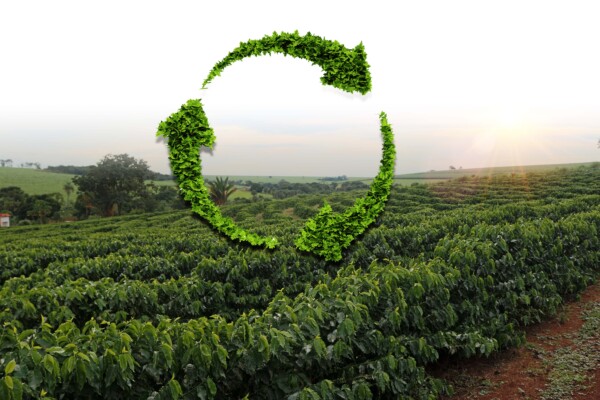
Use of residues and national technologies increase the resilience of Brazilian coffees to external shocks.
The war in Ukraine has reignited the debates regarding Brazil’s dependence on imported fertilizers. The sanctions against Russia imposed by the United States, Europe, Japan, Australia and other Western economies, with the aim of isolating the Eurasian country from the global market, raise great concerns about the impacts on Brazilian agribusiness.
As a whole, Brazil imports 75% to 80% of the fertilizers it uses (of which 95% are potassium, 80% nitrogenous, and 55% phosphate). Russia accounts for 23% of these imports.
In coffee, there are important sources of nutrients generated on the farms themselves. The coffee husk and straw are remainders from wet processing and de-pulping and are generated in large volumes in the coffee areas.
The organic matter is applied to the coffee plantation and treats the soil, improving its physical-chemical and biological characteristics, and providing a gradual availability of nutrientes for the plants.
In addition to being a source of organic fertilizer that gradually releases nutrients, the coffee husk also improves the soil’s moisture retention and biological activity, cation Exchange capacity (CEC), erosion control, the decrease in soil temperature, and also physically controls the growth of weeds under the coffee tree, preventing seed germination.
The coffee husk provides nitrogen (N), phosphorus (P), and potassium (K), with contentes around 1.5% N, 0.15% P2O5, and 3.0% K2O, besides other macronutrients such as calcium and magnesium.

Several studies have shown that the application of dry coffee straw, manure, and Chemical fertilization in combination generates extremely beneficial results for coffee growing compared to chemical fertilization alone. Moreover, at doses 1.0, 2.0, and 4.0 Kg/ha of dry husk, there was a growing increase in production and beverage quality.
In ESG (Socio-Environmental Governance) times, regenerative and organic agriculture, carbono emission balance, and green economy, the use of residues demonstrates the sustainability of Brazil’s coffees.
The national coffee research coordinated by Embrapa Café has generated important national technological solutions for the improvement of soil structure and fertility, water storage capacity, and carbon stock. This is the case with the use of brachiaria decumbens as a cover plant between coffee plantation rows, which increases the water readily available in the soil by 18% to 20% and allows the storage of up to 10.7 t/ha-1 of organic carbon in the first 0.20 m of soil, according to information released by the state-owned¹ company . Under technical guidance for the introduction of brachiaria, studies show no competition with the coffee plant and improved nutrient cycling and incorporation of organic matter into the soil.
The technology has already been adopted in the states of Bahia, Goiás, Espírito Santo, Minas Gerais, São Paulo, and the Federal District, and has significantly contributed to a more sustainable management of weeds in coffee plantations. Growing brachiaria between the rows reduces the use of herbicides and machinery and equipment by 40%, favoring the economic dimension of sustainability by reducing costs and promoting increased productivity, of five coffee bags per hectare.
Embrapa also indicates several benefits to the soil and to coffee nutrition from the growing of coffee trees together with leguminous species, such as Gliricidia and Erythrina². They include increased organic matter content, nutrient cycling, water infiltration, and reduced soil compaction and erosion. There is also improvement in climatic conditions, reduced nutritional demand from coffee trees, and harvesting is made viable in soils with lower fertility levels.
Several projects under development in the scope of the latest call of the Research Coffee Consortium aim at expanding knowledge and generating recommendations on tree-based production systems for Arabica and Coffea Canephora coffee, with a focus on agronomic and economic performance, and on resilience and climate change. Cecafé, as a member of the Deliberative Council on Coffee Policy (CDPC), has been guiding this agenda on Brazilian coffee research aligned with sustainability, together with other agencies in the production chain.
The strengthening of coffee research, the boosting of bio factories and the wide use of formulated residues, with legal instruments that promote the use and commercialization of these bio inputs is fundamental for the continuous advances of Brazilian coffees in sustainability and resilience to external shocks, such as those resulting from the economic sanctions against Russia.
¹http://www.consorciopesquisacafe.com.br/index.php/imprensa/noticias/1049-2021-04-27-17-55-34
²https://www.embrapa.br/agrobiologia/fazendinha-agroecologica/cafe-arborizado
Marcos Matos
CECAFÉ CEO
Silvia Pizzol
CECAFÉ Sustainability Manager


Leave A Comment